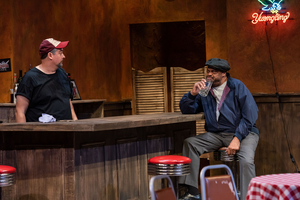Review: SWEAT At St. Louis' Black Rep
'Sweat' brings gripping drama to St. Louis' Black Rep

Lynn Nottage's play, Sweat, is a very fine play indeed. It's bespangled with awards including an Obie for Best Play in 2017 and the Pulitzer Prize for Drama in 2018. The Saint Louis Black Rep has opened its 45th season with a very strong production of the work. It's not to be missed!
Labor strife is innately dramatic. And that strife has appeared on the world's stages at least since Ibsen and Realism turned the theater's attention to social problems in the 19th century. Nottage, in Sweat, raises the same banner that has been flourished by other great playwrights for over a century--Galsworthy, Meyerhold, Hauptmann, Piscator, Brecht, Hellman and (most memorably) Clifford Odets. Sweat examines the same conflict and moves us in the same way as Odets' Waiting for Lefty. Sweat is less a work of blatant agitprop than Lefty, but it is equally searing in its portrayal of the human tragedy arising from capitalism unleashed.
Set in Reading, Pennsylvania (a mid-sized buckle on the Rust Belt), the action takes place in fifteen scenes. Most of them are set in a comfortable, old-fashioned working-class neighborhood bar. These scenes are about a month apart, all in the year 2000. Usually the TV over the bar shows a bit of news to "time-stamp" the coming scene: "Dow-Jones Drops", "Bush/McCain Debate", "Tech Bubble Bursts", "Hillary Polls High".
We meet three women who have long been "best buddies forever". They have worked together on the manufacturing floor of a steel tubing company for over twenty years. They've spent most of their evenings drinking together here in this bar.
- Tracey, a widow, is white. She's spirited--even raucous. Her son Jason also works at the plant. He's a bit of a head-banger with a hot temper, but he's basically a nice kid.
- Cynthia, is black, feisty, and a hard worker. Her son Chris (also working at the plant) is Jason's best bud. Chris has college ambitions. Cynthia is separated from her husband, Brucie, who's been driven to despair and addiction by many months of lockout at his plant.
- Jessie is of Italian descent. She lost her husband to a younger woman--and now spends most of her time in an alcoholic haze.
Presiding at the bar is Stan. He's calm and friendly--always trying to keep arguments from becoming fights. Stan left the plant some years ago when an industrial accident seriously damaged his leg.
There's Oscar, the busboy. He's the quiet, hardworking son of Colombian immigrants. He's constantly busy clearing, fetching, stocking, scraping gum from under the table tops.
Each act begins with a scene set not in 2000, but in 2008. So all the bar scenes are, as it were, flash-backs. The very first scene is set in the office of Evan, a parole counselor. We find that Jason and Chris have each recently been released from prison. Each is finding the adjustment difficult. Why in prison? What did they do? It's an effective hook to capture our curiosity.
Now to the back-story: At first the bar is filled with the merry good fellowship of a birthday celebration among loving friends. We watch, over the months, as that friendship is corroded by rumors of layoffs, by failed union negotiations. One friend is promoted to Supervisor. Has she joined the enemy? A decades-long friendship is tainted by the suspicion of racial preference. Management demands draconian cuts in wages. Must we strike?
Quiet Oscar, the busboy, would make $3 an hour more if he crossed the picket line. Will he become a "scab"?
Ever since the arrival of the first spinning jennies one of the most reliable weapons of Management in its battle against Labor has been Hunger. Now, with the advent of NAFTA that weapon is once more being brought to the battlefield. What can workers do when almost overnight a company can move its operations to Mexico, where labor costs would be a fraction of what they'd pay in the U.S.?
Labor is helpless. Families and lives are shattered. There is rage. There is violence. There is despair.
The very gifted hand of playwright Lynn Nottage makes all these people beautifully real. The dialogue is gorgeously natural and convincing.
The powerhouse cast is uniformly fine. Each one is given rich scenes in which to shine. This is so very much an ensemble piece that it would be wrong (even if it were possible) to single out one actor for praise. They're all superb. The cast consists of Gregory Almanza (Oscar), Velma Austin (Cynthia), Blake Anthony Edwards (Stan), Kelly Howe (Jessie), Franklin Killian (Jason), Amy Loui (Stacey), Don McClendon (Evan), Brian McKinley (Chris) and A.C. Smith (Brucie).
The designers, who beautifully support this story, are Tim Jones (scenery), Jonathan Alexander (lights), Hali Liles (costumes), Kareem Deanes (sound) and Meg Brinkley (properties).
Late in the play the tension mounts quickly into a flash of fierce violence in the most convincing --even frightening--bar-room fight I ever saw. Fight choreographer Paul Steger did masterly work with this.
The Black Rep's Founding Artistic Director Ron Himes directed Sweat. It's another shining star in his crown. It runs at the Edison Theatre on the Washington University campus through September 26.
(Photos by Phil Hamer)
Reader Reviews

Videos
